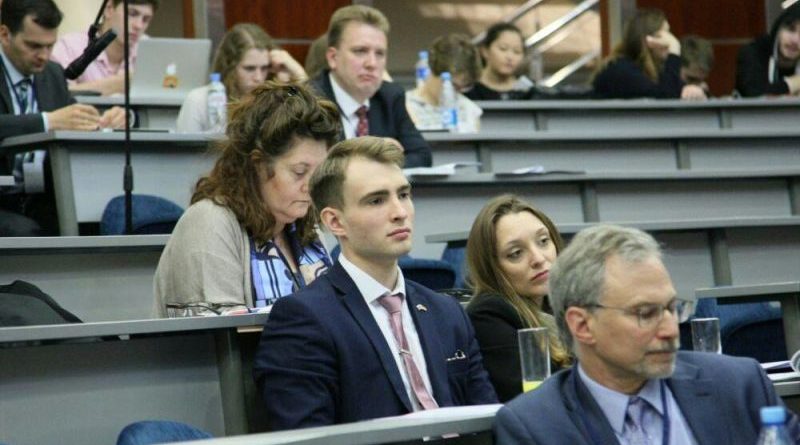Mia Adamowsky Participates in Second Fletcher-MGIMO Conference
Mia Adamowsky, MALD 2018 Candidate, The Fletcher School
“All happy families are alike; each unhappy family is unhappy in its own way.” So opens the celebrated literary classic Anna Karenina by Russian author Leo Tolstoy. Indeed, given the current dynamics of the international order, Tolstoy’s commentary on dysfunctional relationships seems more applicable than ever to the domestic and international relationships of political actors on the world stage. Of course, this includes the relationship between the United States and Russia, whose dysfunction continues to descend to alarming lows.
Last month, I had the opportunity to travel to Moscow to attend the second MGIMO-Fletcher conference on Russian-American relations at Moscow State Institute of International Relations (otherwise known as MGIMO). As the follow up to the first conference that was hosted by the Fletcher School last November, this installment sought to identify mutual interests and potential areas of cooperation between the United States and Russia. Featuring a blend of American and Russian policy experts and academics, the ambitious agenda included panels on nonproliferation, counterterrorism, competing interpretations of international law, and the management of common spaces. Soft power, economic development, and the prospects of normalizing Russian-American relations were also discussed.
Some highlighted areas of possible cooperation between Washington and Moscow included counterterrorism operations and the shared interest in combatting non-state actors such as ISIS. Fletcher Professor Paul Berkman stressed science as “a powerful tool of diplomacy” that can help build common interests between state actors and contributes to informed decision-making. Continued science diplomacy in outer space, scientific research in the North and South Poles, management of the high seas, and coordination in the emergent Arctic region were also named as potential areas of cooperation that could serve to facilitate better bilateral relations. However, panelists cited the escalating distrust between the United States and Russia, as well as the two powers’ loss of confidence in each other, as significant impediments to substantive bilateral cooperation in the near-term.
Many of the conference panelists underscored the grave lack of trust as a critical problem in overcoming the continuing dysfunction in Russian-U.S. relations, while the lack of substantive communication between Washington and Moscow was cited as a reason for worsening mutual perceptions and an increasing risk of miscalculation. A common thread throughout the conference was an emphasis on the need for more dialogue and discourse. Tatyana Shakleina, Chair of the Department of Applied International Political Analysis at MGIMO, supported more academic, student, and youth exchanges between Russia and the United States. She also and called for a more “mutual approach to mutual understanding,” such as through joint publications by U.S. and Russian thinkers.
Gregory Borisenko, Director of the Department of North America at the Ministry of Foreign Affairs of the Russian Federation, and Thomas Leary, Minister Counselor for Public Affairs at the Embassy of the United States, Moscow, individually stressed the need for more people-to-people exchanges between both countries. Mr. Borisenko cited the special responsibility shared by the Russian Federation and the United States as the world’s two biggest nuclear superpowers. He said that people-to-people exchanges are important because they help to reduce mistrust and misunderstanding, improve mutual perceptions, and eventually influence government. Similarly, Mr. Leary said that the only way forward for the Russian-U.S. relationship was through communication, dialogue, and common interests, with trade and economic engagement being key for better relations. Steven Block, Academic Dean at The Fletcher School, quoted The Fletcher School’s Dean James Stavridis’ recommendation that the United States should “confront when necessary and cooperate when possible” with Russia.
Andranik Migranyan, Professor of Political Science at MGIMO University, stressed that more educational and youth exchange programs between the United States and Russia were needed for the simple reason that people who spent time studying and/or living in foreign countries were unlikely to bomb each other. With nuclear weapons at hand, the risk of miscalculation between the United States and Russia cannot be underestimated, nor its consequences overstated. Thus, communication between Washington and Moscow—whether contentious or congenial—remains as the best preventative measure against that critical risk.

